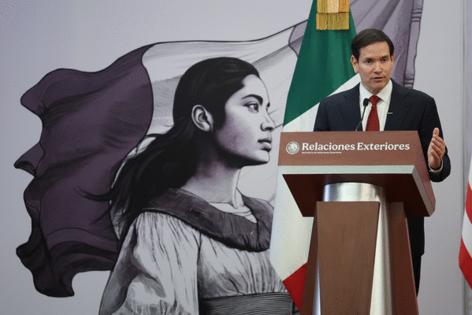US, Mexico pledge deeper ties as Trump defends strike on alleged cartel boat
Published in News & Features
MEXICO CITY — U.S. and Mexican officials agreed Wednesday to bolster cooperation on a range of joint security concerns — including drug smuggling, illegal migration and arms-trafficking — as Secretary of State Marco Rubio defended President Donald Trump’s controversial decision to order an attack on an alleged smuggling boat in the Caribbean Sea.
The top U.S. diplomat held his first meeting with President Claudia Sheinbaum a day after the dramatic Pentagon strike provided a potential portent of what many Mexicans fear — a unilateral U.S. military attack on suspected cartel targets inside Mexico.
Tuesday’s action on a vessel that had departed Venezuela killed 11 sea-born “narcoterrorists” who were transporting drugs destined for the United States, said Trump, who released what he described as a video of the attack.
In Mexico, Rubio hailed the strike, stating that traditional interdiction efforts had failed to stop the flow of drugs via the Caribbean. “What will stop them is when you blow them up,” Rubio told reporters in Mexico City. “You get rid of them.”
Such strikes may be ongoing and will likely continue, Rubio said, providing no additional details.
The secretary of State sidestepped a question about whether the action, which critics denounced as illegal under international law, signaled a return to “gunboat diplomacy” in a region where U.S. interventions have historically stoked resentment.
While Trump said Tuesday’s attack took place in international waters, he has not ruled out strikes inside Mexico, where his administration has designated half a dozen cartels as foreign terrorist organizations. He has pushed for the use of the military against drug smugglers. Trump has reportedly issued a secret order directing the Pentagon to strike at Latin American cartels.
According to the Trump administration, its ongoing deployment of warships in the southern Caribbean is aimed at deterring drug-trafficking from Venezuela — not toppling the government of Venezuelan President Nicolás Maduro. U.S. prosecutors have accused Maduro of being a cartel leader, a charge dismissed as propaganda by the Venezuelan leader.
But the naval buildup in the Caribbean has also raised concerns in Mexico, which is the primary conduit of cocaine, fentanyl and other illicit drugs entering the United States.
Many observers in Mexico view the designation of cartels as terrorist groups — which the Mexican government vociferously opposed — as providing a possible justification for attacking cartels on Mexican territory.
The strike in the Caribbean shows “the type of attacks that could be directed to Mexican people and vehicles,” wrote columnist Julio Hernández López in Mexico’s La Jornada newspaper. “One can only hope that the president can avoid as much as possible the political, economic, and even ballistic barrage from Trump and his hawks.”
Rubio’s first trip to Mexico as secretary of State has long been anticipated in Mexico, where Sheinbaum has been walking a fine line. Mexico’s first woman president, a lifelong leftist, has endeavored to placate Trump on drug-smuggling, tariffs and other contentious issues, while also assuring her nationalist base that she is not caving to U.S. demands.
Sheinbaum has rebuffed Trump’s offer of direct U.S. military aid to assist Mexico combat cartels. Her decision, according to Trump, was based on her fear of organized crime. Trump has charged that organized crime pervades Mexico’s government, a charge denied by Sheinbaum.
On Wednesday, when asked about Trump’s assertion that she feared the cartels, Sheinbaum answered in characteristically non-confrontational fashion.
“It’s not true ... but we maintain good relations,” Sheinbaum responded. “We have great respect for the Mexican-United States relationship, and for President Trump.”
A joint U.S.-Mexico statement on binational cooperation stressed “respect for sovereignty and territorial integrity ... as well as mutual trust.” But Mexican commentators pointed out that there was no guarantee that the Trump administration would not strike unilaterally against cartel targets in Mexico.
The goal, the statement said, “is to work together to dismantle transnational organized crime through enhanced cooperation.”
Despite rising tensions in U.S.-Mexico relations, Rubio was effusive in his praise of Mexican law enforcement efforts. He cited Mexico’s recent decision to turn over to U.S. prosecutors dozens of jailed suspects wanted in the United States.
“That’s not an easy thing to do,” Rubio said, appearing at a joint news conference with his Mexican counterpart, Juan Ramón de la Fuente.
On an issue of particular concern to Mexico — the southbound traffic of arms, including assault weapons, grenade launchers, mines and other military-grade weapons — Rubio said U.S. authorities were determined to “put a stop to it.” He pointed to the danger of drones in the hands of organized crime, “threatening states, threatening security forces.”
Both diplomats praised the binational efforts that have helped reduce illicit crossings along the U.S.-Mexico border to levels not seen in decades. Mexico has deployed thousands of its troops to its border with the United States. They are tasked with reducing illicit immigration, drug-smuggling and other crimes.
But Rubio offered little hope to Mexico on another crucial issue: Tariffs. In July, Mexico won a 90-day reprieve on a Trump administration plan to impose 30% tariffs on Mexican imports. Rubio voiced the hopes that ongoing talks between Mexico and the United States could result in a successful trade deal.
_____
Special correspondent Sánchez Vidal reported from Mexico City and staff writer McDonnell from Boston.
_____
©2025 Los Angeles Times. Visit at latimes.com. Distributed by Tribune Content Agency, LLC.







Comments